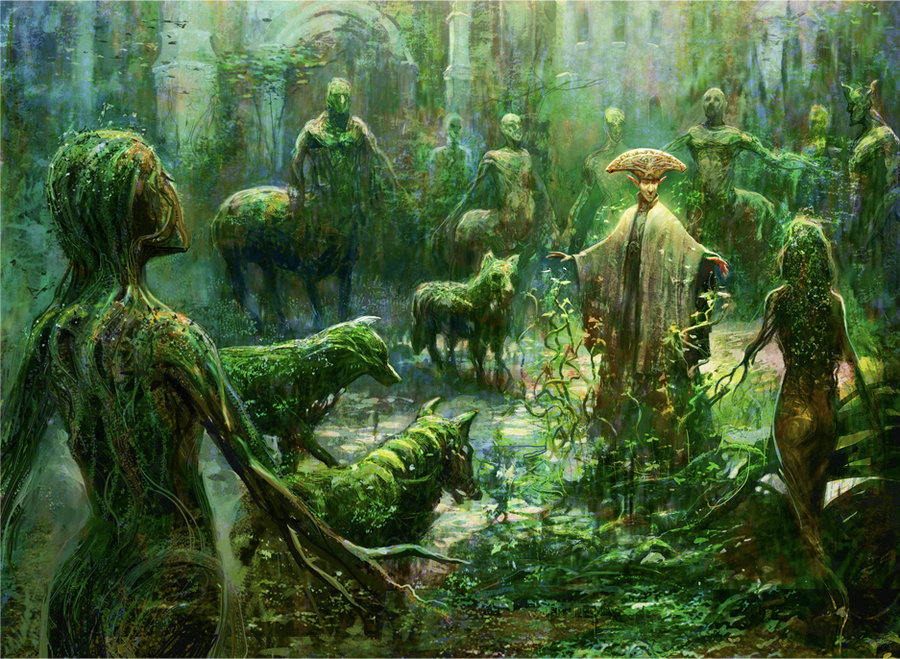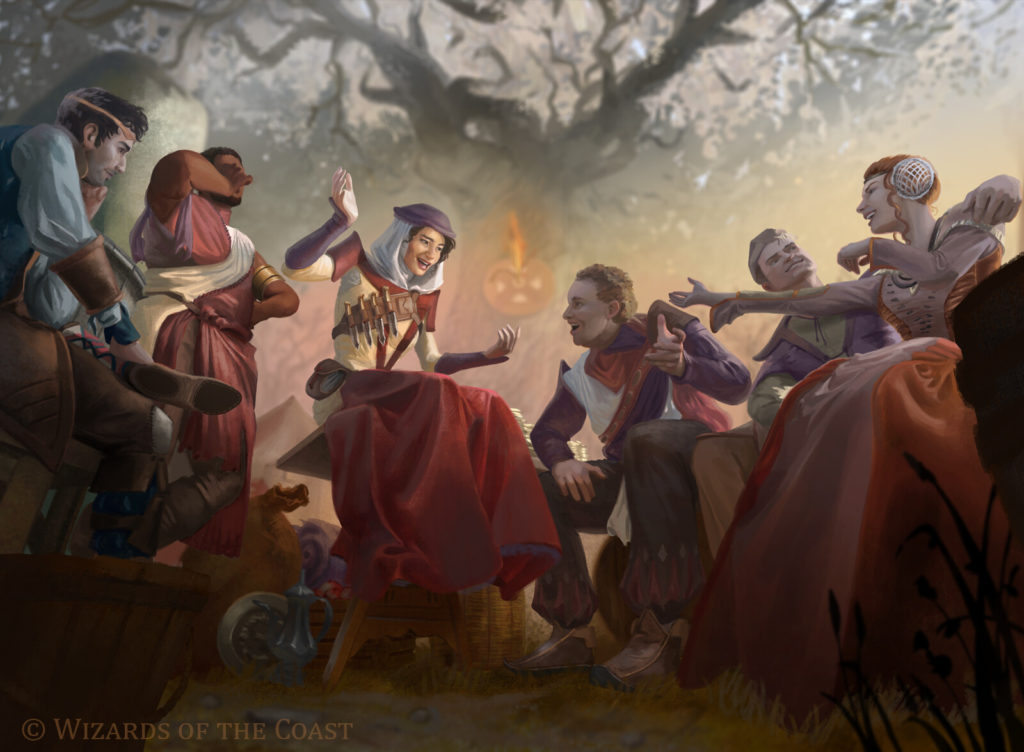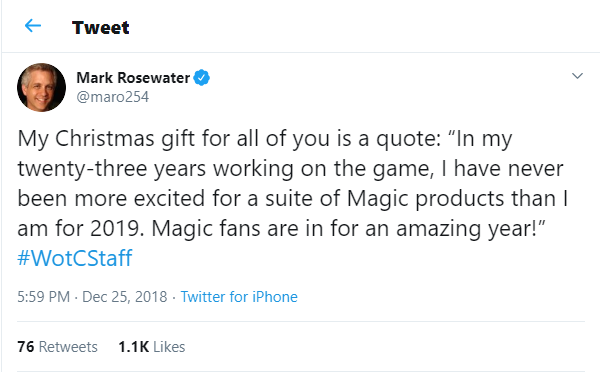In the words of Mark Rosewater, 2019 was set to be one of the most exciting years for Magic yet. Between the epic conclusion to the Bolas plot line, the great draft environment of Modern Horizons, and one of the better Core Sets in years, we’ve had some great moments.
Products weren’t the only things that achieved success for Wizards this year. The latest edition to the line up of Magic events is CommandFest, a Commander celebration focusing on all things multiplayer Magic. The first of these events took place concurrently in Chicago and Seattle this weekend, with another scheduled for December 13-15 in Washington DC. These gatherings come hot on the tail of the roaring success enjoyed by the CommandZone play area at MagicFest Vegas, with over one thousand attendees.
I previously covered what I thought Commander needed after MagicFest Vegas; and with the slew of new Commander product announcements this week, it’s easy to feel a little anxious about where things go from here. The first feeling many had at this news was of overwhelming wallet fatigue—a feeling we’ve likely already experienced, and recently at that.
Another Side, Another Story
Wallet fatigue is a great segue into the fact that 2019 has not been bereft of issues—in fact, far from it. The year saw the Hasbro eBay store vastly underestimating the infrastructure needed to sell the War of the Spark: Mythic Edition for starters. Few can forget the gauntlet of Q1-Q2 products in which we lived a perpetual spoiler season. Before we’d even figured out the finer story points of War of the Spark (which had their own hurdles, shall we say), Modern Horizons was edging its way into our spoiler feeds. No sooner had we finished with that, it was on to Core 2020—and that’s not to mention the supplementary products spoiled in the same windows.
Modern Horizons was an excellent set, particularly from a draft point of view. The main issue was that drafting such a set at premium price points left many players wanting, especially after War of the Spark necessitated purchases for many players. It was a frustrating predicament—the best draft set in years, but sadly beyond participation for many in the player base.
Whilst we have made some great progress this year with Commander events, Competitive Magic is by all accounts suffering from the inevitable push towards the eSports model. The shifting of focus to Magic: Arena events gave rise to issues that are simply not a problem in paper magic, the most egregious perhaps the client crashes mid-tournament. This, coupled with decreasing confidence in Wizards’ ability to avoid printing problematic cards for both Standard and Modern, has left many in the long-term player base with a waning interest and in some cases feeling like there isn’t a place in Magic for them at all.
Other issues have included the now traditional conservative reprint equity, the ‘wonky’ color pie, and the stripped back event schedules that have left many players in competitive areas such as Europe and APAC territories feeling like giving up.
Magic is Growing Too Fast

Growing Ranks by Seb McKinnon
Whilst it’s a good thing to be aware of, discuss and even champion some of these issues—especially if you’re in a place of influence—it’s also key to realize that some of these things cannot be changed quickly, if at all. It’s fair to speculate that some of these issues are down to the way Wizards is financed and pushed in certain directions by Hasbro; and for some of them, you’d probably be correct.
A great number of these problems can be evaluated as symptoms of a deeper issue, though: Magic is growing too fast. Now, it’s important to clarify that I don’t mean from a “shareholder” point of view; this isn’t the axis on which I want to evaluate the game. Rather, the game has splintered focus in so many directions that it’s beginning to feel like butter spread over too much bread. It might be fair, then, to say that rather than too fast, Magic is growing too wide.
When any company diversifies its approach too broadly, it enters the precarious and sometimes disastrous scenario of trying to please too many people and ultimately failing them all. Whilst this is business 101 and something that many small to medium businesses have no issues avoiding, it’s something that many larger businesses forget, often to their detriment. A great way to frame this user experience issue is when comparing it to restaurant menus. Gordon Ramsay’s approach is to simplify a menu as much as possible—not only does it simplify things for consumers, but also for the chefs, who will take more pride and time on a less demanding routine, and ultimately cut corners less often.
What Wizards Can Do
In casting such a wide net, Wizards run a much higher risk of failures on a UX (user experience) level. Their Play Design team, which have crafted some of the most enjoyable and interactive Standard environments of recent years, are likely suffering under the pressure of having to serve so many dishes (or in this case, formats).
I mentioned earlier that some these issues were likely due to how Hasbro directs Wizards. I’d add that I believe that many, if not most of the others are Wizards effectively hamstringing themselves by trying to please everyone all of the time.
It’s easy to only concentrate on the negatives, which is a sadly normative way of interacting with the world; but Wizards continue to try, fail, learn, and adapt to the spreading demands of the increasingly fractured playerbase and put out some cracking products. Pioneer might be seen by some as a cynical way to inflate reprint equity in more recent cards and allow Wizards to move away from eternal formats like Legacy and Modern, but it’s arguably the right move to make.
It’s inevitable that, as time goes on, older formats fall out of favor. Short of abolishing the Reserved List and printing entire sets of reprints—which we know is unlikely—we will one day have to say goodbye to Legacy and eventually Modern as Wizards eventually relinquish their support for them.
Currently, we have one card pool, Standard, designed to slot into Legacy, Modern, Standard, and now Pioneer. Wizards have admitted in the past that Vintage is on their radar but far from the top of the list. It’s not a stretch to say that this is indeed a Kitchen Nightmare, and consolidating the portfolio is a necessary step to take for the health of the game.
We’ve seen the early steps of this, not only in the emergence of Pioneer, but in the huge shift in focus to the Commander line of products for 2020. Wizards have very correctly recognized that their best interests lie in serving this large section of the player base, and I don’t fault them for leaning into it.
They really need to recognize, before it’s too late, that the Competitive side of their player base is equally important. Competitive Magic is what draws in Standard players, and selling Standard sets is the backbone of not only paper Magic, but Magic in general. While Arena might draw in short-term consumers; its current issues with stability, lack of in-demand events like Brawl and Pioneer, and ultimately being digital mean that it isn’t the golden goose Hasbro is searching for. I have my own issues with how Arena is less engaging than paper magic as an enfranchised viewer, but this isn’t the place for that.
What We Can Do

Outlaw’s Merriment by Suzanne Helmigh
Magic is probably the greatest game on the planet. It offers a constantly evolving challenge, enthralling and beautiful artwork, and a social aspect that has widened friendship circles for many lucky enough to afford to play the game. When the future of the game is in flux and confidence wanes, a slew of new product announcements can be the straw that breaks the camel‘s back.
As much as Wizards are ultimately the ones that will need to solve the wider issues, as a community we can do our best to feed back in as many forums as possible when things aren’t going to plan. Mark Rosewater still has an active and busy Tumblr page which receives feedback; and through various channels, it’s surprisingly easy to get in touch with the people behind the game. It might feel like we’re powerless, and in many ways (particularly with competitive Magic) that may be the case; but small changes can give us hope that our feedback is being listened to. The introduction of fractional invites is a step in the right direction.
Beyond this, though, many feel exhausted by the current release schedule. There’s a lot of product scheduled for 2020—that we know about!—and I feel like it’s the right time to address how best to navigate it.
Fear of Missing Out
FOMO, the “Fear of Missing Out,” is the anxiety caused by the idea that by missing out on certain experiences, you’re worse off, or that others are having a better time than you. It’s a relatively modern concept that has risen in usage alongside social media, one of the major generators of FOMO in our lives. While it’s easy to objectively reason that others are showcasing only their best lives online, it can be a lot harder to shake the anxiety day-to-day.
It’s easy to feel overwhelmed by choice when it comes to Magic. We have a bunch of different ways to play, whether that’s digitally or on paper, Modern to Commander, Pauper to Cube. There’s always news breaking, and keeping up with it on social media can become a stressful chore.
With more products comes more concerns that we can’t keep up, or afford to take part in all of the fun, especially with more events like CommandFest taking place that we might want to attend.
It’s even a factor in our enjoyment of our favorite Magic content. It’s never been a better time to consume content, with great up-and-coming Commander shows like Quest for the Janklord competing for the time you spend on the creators you know and love, and the likes of written content and to a lesser extent podcasts often living their life in the shadow of YouTube.
Time is the key factor in all of this, and as much as it’s our wallets that suffer most tangibly when we try to over commit, it’s time that’s the most precious currency we have. It’s important to acknowledge that you can’t see or do it all. Just like you can’t see every movie that comes out, or how some of the books on your shelf remain unread, or how you’ll probably never get to visit every country you’d like to—you can’t support and take part in all aspects of Magic.
It’s okay to miss out on some of it, because not all of it is for you. Magic is an ever moving and ever changing constant in our lives, and it’s important to lean on that aspect—it’s here to enjoy, and arguably always will be even if Wizards shuts tomorrow.
While Wizards has its own hurdles to get over in facilitating the quality of their game, we can all achieve a lot by taking a step back—only by doing that can you gain a new perspective. Accepting that it’s not all for you is the first step to identifying what you love about the game. Only then can you pour your passion into what matters.
Kristen is a lover of both Limited and Commander, and can most often be found championing the Boros Legion when called upon to sit down and shuffle up. Based in the UK, she works as a software developer, and her love for the Legion is second only to her appreciation for Lord of the Rings and Mass Effect.


